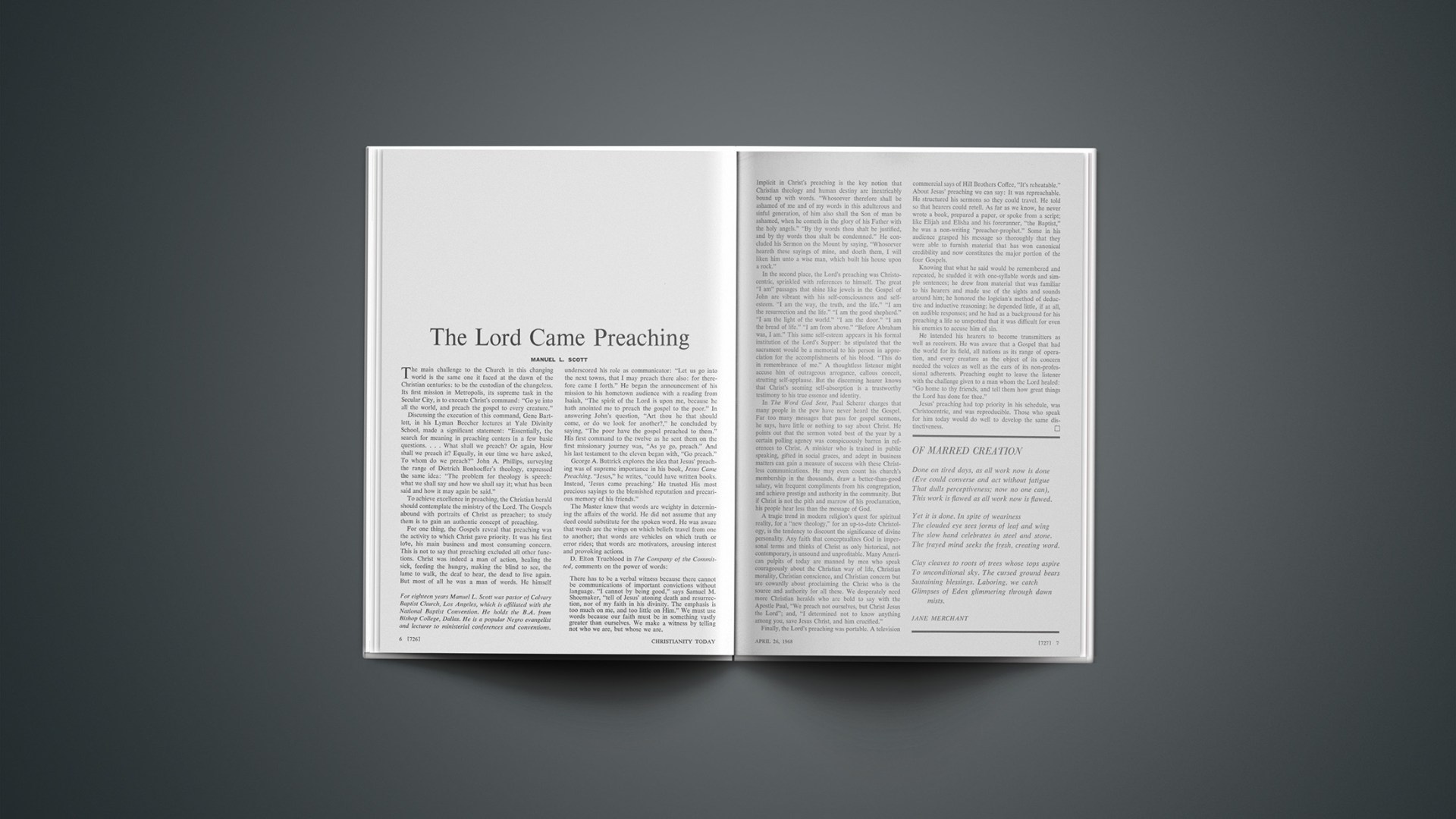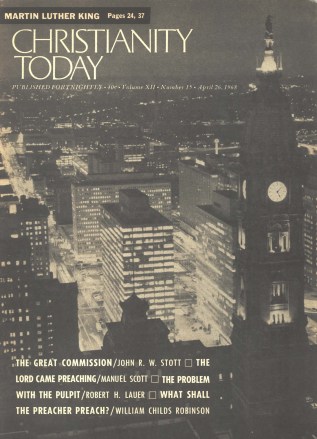The main challenge to the Church in this changing world is the same one it faced at the dawn of the Christian centuries: to be the custodian of the changeless. Its first mission in Metropolis, its supreme task in the Secular City, is to execute Christ’s command: “Go ye into all the world, and preach the gospel to every creature.” Discussing the execution of this command, Gene Bartlett, in his Lyman Beecher lectures at Yale Divinity School, made a significant statement: “Essentially, the search for meaning in preaching centers in a few basic questions.… What shall we preach? Or again, How shall we preach it? Equally, in our time we have asked, To whom do we preach?” John A. Phillips, surveying the range of Dietrich Bonhoeffer’s theology, expressed the same idea: “The problem for theology is speech: what we shall say and how we shall say it; what has been said and how it may again be said.”
To achieve excellence in preaching, the Christian herald should contemplate the ministry of the Lord. The Gospels abound with portraits of Christ as preacher; to study them is to gain an authentic concept of preaching.
For one thing, the Gospels reveal that preaching was the activity to which Christ gave priority. It was his first love, his main business and most consuming concern. This is not to say that preaching excluded all other functions. Christ was indeed a man of action, healing the sick, feeding the hungry, making the blind to see, the lame to walk, the deaf to hear, the dead to live again. But most of all he was a man of words. He himself underscored his role as communicator: “Let us go into the next towns, that I may preach there also: for therefore came I forth.” He began the announcement of his mission to his hometown audience with a reading from Isaiah, “The spirit of the Lord is upon me, because he hath anointed me to preach the gospel to the poor.” In answering John’s question, “Art thou he that should come, or do we look for another?,” he concluded by saying, “The poor have the gospel preached to them.” His first command to the twelve as he sent them on the first missionary journey was, “As ye go, preach.” And his last testament to the eleven began with, “Go preach.”
George A. Buttrick explores the idea that Jesus’ preaching was of supreme importance in his book, Jesus Came Preaching. “Jesus,” he writes, “could have written books. Instead, ‘Jesus came preaching.’ He trusted His most precious sayings to the blemished reputation and precarious memory of his friends.”
The Master knew that words are weighty in determining the affairs of the world. He did not assume that any deed could substitute for the spoken word. He was aware that words are the wings on which beliefs travel from one to another; that words are vehicles on which truth or error rides; that words are motivators, arousing interest and provoking actions.
D. Elton Trueblood in The Company of the Committed, comments on the power of words:
There has to be a verbal witness because there cannot be communications of important convictions without language. “I cannot by being good,” says Samuel M. Shoemaker, “tell of Jesus’ atoning death and resurrection, nor of my faith in his divinity. The emphasis is too much on me, and too little on Him.” We must use words because our faith must be in something vastly greater than ourselves. We make a witness by telling not who we are, but whose we are.
Implicit in Christ’s preaching is the key notion that Christian theology and human destiny are inextricably bound up with words. “Whosoever therefore shall be ashamed of me and of my words in this adulterous and sinful generation, of him also shall the Son of man be ashamed, when he cometh in the glory of his Father with the holy angels.” “By thy words thou shalt be justified, and by thy words thou shalt be condemned.” He concluded his Sermon on the Mount by saying, “Whosoever heareth these sayings of mine, and doeth them, I will liken him unto a wise man, which built his house upon a rock.”
In the second place, the Lord’s preaching was Christocentric, sprinkled with references to himself. The great “I am” passages that shine like jewels in the Gospel of John are vibrant with his self-consciousness and self-esteem. “I am the way, the truth, and the life.” “I am the resurrection and the life.” “I am the good shepherd.” “I am the light of the world.” “I am the door.” “I am the bread of life.” “I am from above.” “Before Abraham was, I am.” This same self-esteem appears in his formal institution of the Lord’s Supper: he stipulated that the sacrament would be a memorial to his person in appreciation for the accomplishments of his blood. “This do in remembrance of me.” A thoughtless listener might accuse him of outrageous arrogance, callous conceit, strutting self-applause. But the discerning hearer knows that Christ’s seeming self-absorption is a trustworthy testimony to his true essence and identity.
In The Word God Sent, Paul Scherer charges that many people in the pew have never heard the Gospel. Far too many messages that pass for gospel sermons, he says, have little or nothing to say about Christ. He points out that the sermon voted best of the year by a certain polling agency was conspicuously barren in references to Christ. A minister who is trained in public speaking, gifted in social graces, and adept in business matters can gain a measure of success with these Christless communications. He may even count his church’s membership in the thousands, draw a better-than-good salary, win frequent compliments from his congregation, and achieve prestige and authority in the community. But if Christ is not the pith and marrow of his proclamation, his people hear less than the message of God.
A tragic trend in modern religion’s quest for spiritual reality, for a “new theology,” for an up-to-date Christology, is the tendency to discount the significance of divine personality. Any faith that conceptualizes God in impersonal terms and thinks of Christ as only historical, not contemporary, is unsound and unprofitable. Many American pulpits of today are manned by men who speak courageously about the Christian way of life, Christian morality, Christian conscience, and Christian concern but are cowardly about proclaiming the Christ who is the source and authority for all these. We desperately need more Christian heralds who are bold to say with the Apostle Paul, “We preach not ourselves, but Christ Jesus the Lord”; and, “I determined not to know anything among you, save Jesus Christ, and him crucified.”
Finally, the Lord’s preaching was portable. A television commercial says of Hill Brothers Coffee, “It’s reheatable.” About Jesus’ preaching we can say: It was repreachable. He structured his sermons so they could travel. He told so that hearers could retell. As far as we know, he never wrote a book, prepared a paper, or spoke from a script; like Elijah and Elisha and his forerunner, “the Baptist,” he was a non-writing “preacher-prophet.” Some in his audience grasped his message so thoroughly that they were able to furnish material that has won canonical credibility and now constitutes the major portion of the four Gospels.
Knowing that what he said would be remembered and repeated, he studded it with one-syllable words and simple sentences; he drew from material that was familiar to his hearers and made use of the sights and sounds around him; he honored the logician’s method of deductive and inductive reasoning; he depended little, if at all, on audible responses; and he had as a background for his preaching a life so unspotted that it was difficult for even his enemies to accuse him of sin.
He intended his hearers to become transmitters as well as receivers. He was aware that a Gospel that had the world for its field, all nations as its range of operation, and every creature as the object of its concern needed the voices as well as the ears of its non-professional adherents. Preaching ought to leave the listener with the challenge given to a man whom the Lord healed: “Go home to thy friends, and tell them how great things the Lord has done for thee.”
Jesus’ preaching had top priority in his schedule, was Christocentric, and was reproducible. Those who speak for him today would do well to develop the same distinctiveness.
Of Marred Creation
Done on tired days, as all work now is done
(Eve could converse and act without fatigue
That dulls perceptiveness; now no one can),
This work is flawed as all work now is flawed.
Yet it is done. In spite of weariness
The clouded eye sees forms of leaf and wing
The slow hand celebrates in steel and stone.
The frayed mind seeks the fresh, creating word.
Clay cleaves to roots of trees whose tops aspire
To unconditional sky. The cursed ground bears
Sustaining blessings. Laboring, we catch
Glimpses of Eden glimmering through dawn mists.
JANE MERCHANT
Milton D. Hunnex is professor and head of the department of philosophy at Willamette University, Salem, Oregon. He received the B.A. and M.A. degrees from the University of Redlands and the Ph.D. in the Inter-collegiate Program in Graduate Studies, Claremont, California. He is author of “Philosophies and Philosophers.”










